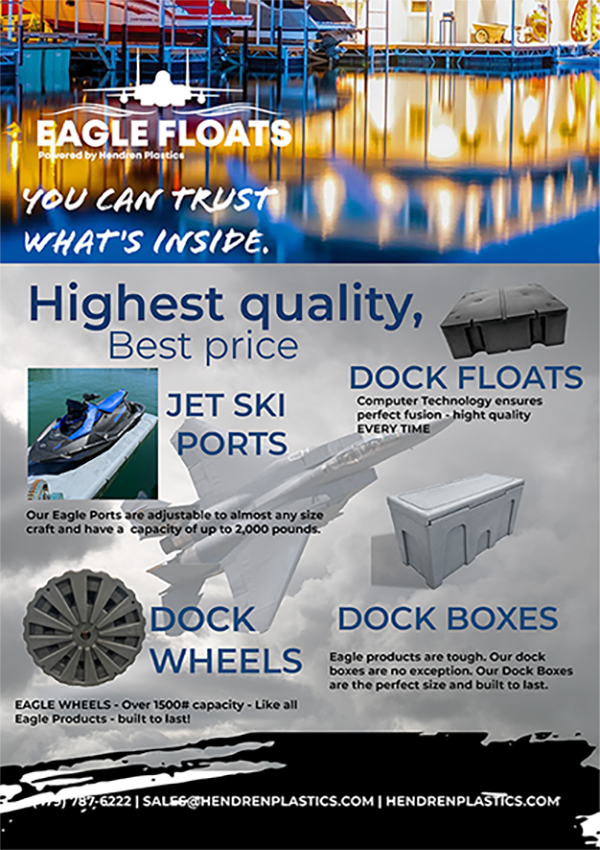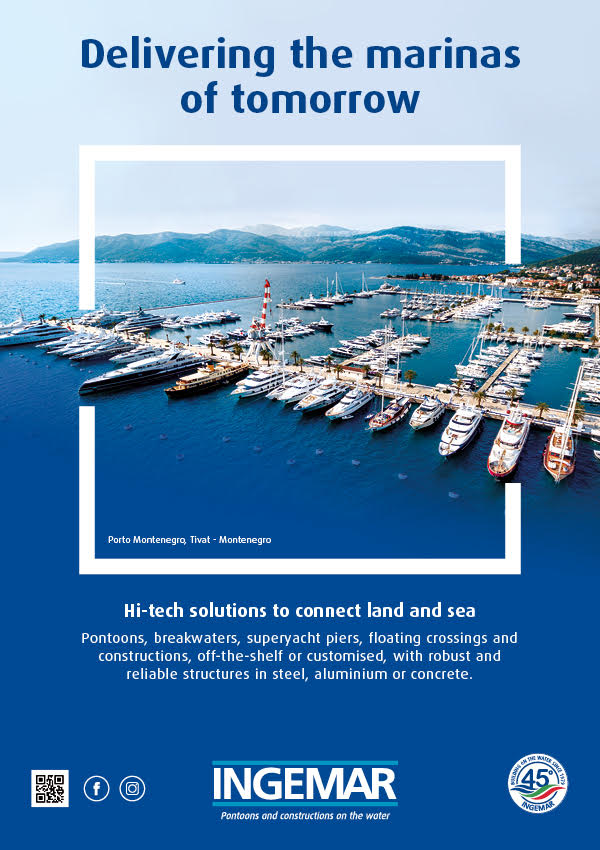Tangible benefits for the local area
Family-owned marina group Yacht Havens, which comprises eight marinas in the UK and one in the Netherlands, has been operating marinas for more than 50 years, having opened its first marina – Lymington Yacht Haven – in 1972. Since then, the group has built up an impressive portfolio of marinas offering 4,000 berths located in some of the UK’s most picturesque areas famed for their coastlines, seas, wildlife and habitats.
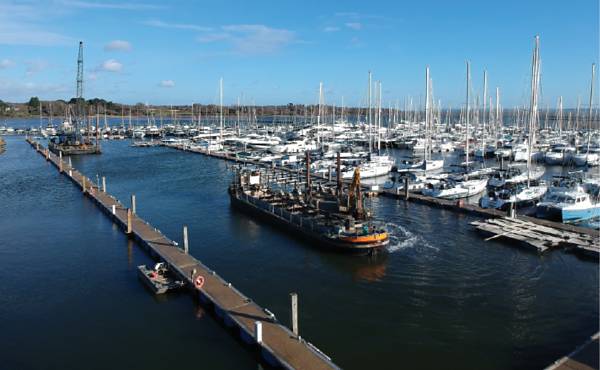
Dredging barges in Lymington Yacht Haven on their way to help protect the nearby salt marshes.
“We invest in a wide range of environmental projects and initiatives around our sites,” Cook continues. “These projects all offer tangible environmental benefits to the local area, the local community and/or our boating communities. They are driven by passionate staff who are not only able to support the launch of these projects, but also assist and maintain them on an ongoing basis.”
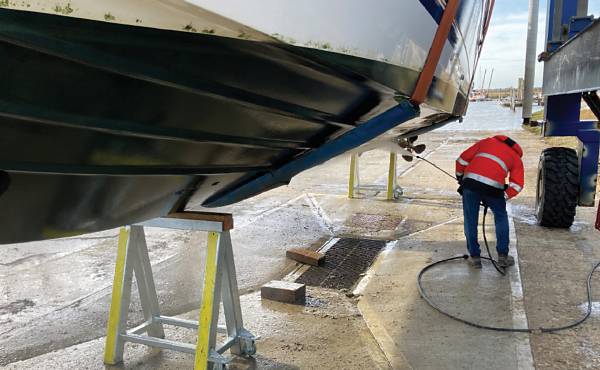
Interceptor tanks installed at Plymouth Yacht Haven trap oils, paint fragments and other materials to ensure they cannot enter the water when boats are lifted ashore.
Most Yacht Haven locations have also launched a green initiative that best supports the local area. “From autonomous waste vessels in Plymouth, marshland regeneration on the Solent, washdown filtration systems in North Fambridge, to oyster nurseries in Largs – we are proud that each of these projects contributes towards operating a sustainable and responsible marina,” Cook adds.
Dredging at Lymington
At Lymington Yacht Haven, on England’s south coast, a rise in sea levels and the rigours of natural waves have eroded the saltmarsh coastline over the last century, impacting the town’s harbour. As the marshes play an important role in shielding marinas, moorings and sea defences from wave attacks, marina manager Rupert Wagstaff decided that “something had to be done to protect the sustainability of the salt marshes, inhabiting wildlife and the future enjoyment of boating enthusiasts to come.”
In a pioneering scheme, the marina joined forces with Lymington Harbour Commissioners (LHC) to reduce marsh erosion by dredging mud from the outer reaches of the riverbed and relocating it to the east side of the river. This creates a sediment-rich reef that helps to protect the salt marshes behind.
The first phase of the scheme finished in 2017, having dredged 19,380 tonnes of mud to build an intertidal area at ‘Boiler Marsh’, which had previously suffered considerable erosion. The marina was then awarded a five-year licence for a second scheme to dredge 10,000 tonnes of mud every year until 2024.
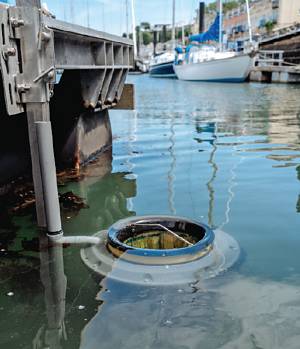
Plymouth Yacht Haven is the first marina in the group to have a Seabin debris collection device installed. It can hold up to 20kg of litter at a time.
“As custodians, we’re responsible for maintaining our marinas for the next generations, protecting and preserving our neighbouring wildlife’s habitats,” Wagstaff says. “[We’re] doing what we can to future-proof our marinas for generations to come, so our berth holders can potter in and out of Lymington River, spot different species of wading birds, wild fowl, marine wildlife and enjoy the beautiful surroundings.”
Removing plastic from the sea
Plymouth Yacht Haven is the group’s first location to reap the benefits of the award-winning ‘Seabin’ technology, which removes debris, plastics and microplastics from the sea. Made from recyclable materials, the Seabin draws water in before pumping it through a fine mesh and collecting the resulting waste. The device can hold up to 20kg of litter at a time, and can capture over 1.4 tons of debris a year. The marina team can then collect the waste from the basket and recycle it.
First developed in 2016 in Australia, there are now almost 1,000 Seabins worldwide, but this is the first permanently located in Plymouth, which has recently become the UK’s first National Marine Park. “Working and living by the water, we see first hand the impact of marine litter and its effect on marine wildlife around Plymouth,” says Steve Kitchen, marina director.

Dredging and relocating mud from the outer reaches of the riverbed in Lymington is creating a sediment-rich reef that helps protect the salt marshes behind.
Mussels vs microplastics
Scientists at Plymouth Marine Laboratory (PML) have installed cages filled with mussels at three Yacht Havens sites as part of a trial project to establish how effectively they can remove microplastics from tidal, estuarine waters.
Earlier laboratory experiments conducted by the team using a custom-designed flume tank showed that a cluster of 300 blue mussels – around 5kg – could filter out over 250,000 microplastics an hour. This is achieved by harnessing the natural filtering power of the mussels, which get their food by filtering seawater, sieving out plankton and other nutritious particles and flushing out unwanted particles from their digestive systems. As part of this process, microplastics are ejected in their waste, which can then be collected as it sinks.
Mussel cages have now been placed at Plymouth Yacht Haven, Turnchapel Wharf, Yacht Haven Quay, as well as a location on the Kingsbridge estuary.
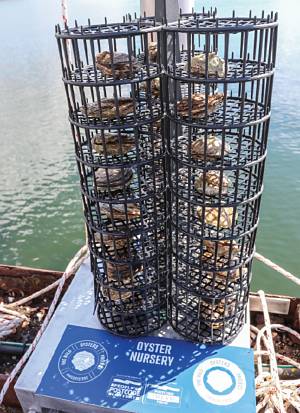
An oyster nursery at Largs Yacht Haven (photo: Zoological Society London).
“An estimated eight million tonnes of plastic end up in the ocean every year – that’s the equivalent to a full truckload dumped into the sea every minute,” explains Professor Pennie Lindeque, head of Science, Marine Ecology and Biodiversity at PML. “Through lab-based experiments and early trials, we have shown that mussels could play a valuable role in helping to extract microplastics – effectively collecting up and leaving the recycling out for us to then dispose of. We are incredibly excited to see how well these new custom-made cages will work and very grateful to Yacht Haven Marinas Group for their support.”
Waste Sharks at Turnchapel Wharf
Last year, Yacht Haven’s 14-acre (5.7ha) marine business park, Turnchapel Wharf in Plymouth, began trialling use of the ‘Waste Shark’ – a remote operated vehicle (ROV) that surveys the surface of the seas, collects litter and helps to keep the natural environment clean.
Working in collaboration with Plymouth-based robotics and artificial intelligence expertise MSUBS and Marine AI, the project will look at adapting and enhancing the technology of the basic Waste Sharks to work autonomously moving around the water to where the plastic waste is collecting.
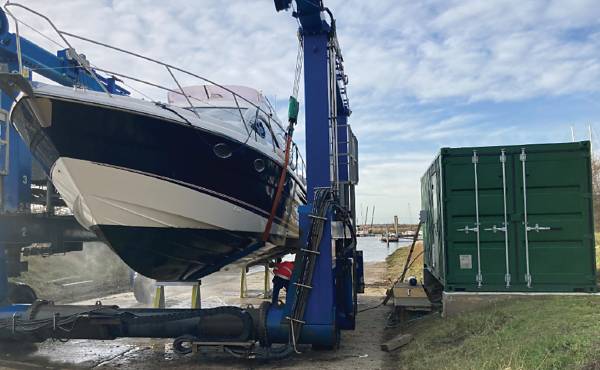
Interceptor tanks at work in Fambridge Yacht Haven, Essex.
In 2021, Largs Yacht Haven on the Firth of Clyde in Scotland was selected to take part in the Wild Oysters Project, which saw 1,300 native oysters returned to the water as part of an ambitious restoration project to bring back these ‘ocean superheroes’ from the brink of extinction.
The three-year, £1.9 million Wild Oysters Project is a partnership between the Zoological Society of London (ZSL), Blue Marine Foundation (BLUE) and British Marine.
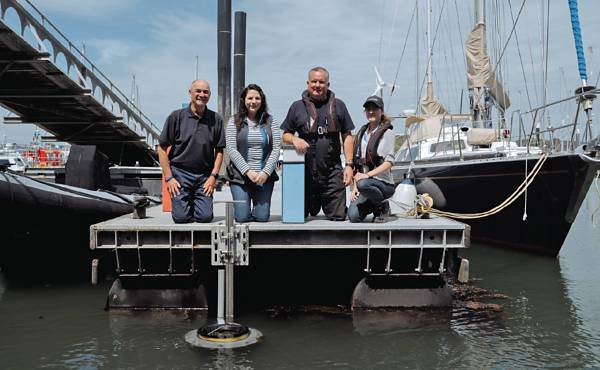
The Seabin team at Plymouth Yacht Haven l to r: Steve Kitchen, marina director; Viki Lakey, boatyard coordinator; Sam Blackburn, engineer Boskalis Westminster; and Isobel Loxton, compliance officer Boskalis Westminster.
Today, Largs Yacht Haven is home to nurseries filled with oysters suspended underneath marina pontoons, which create a micro habitat where the oysters can reproduce. Each adult oyster can filter 200 litres of water a day.
British Marine environment executive, James Scott-Anderson, said: “British marinas are once again enabling the recovery of oysters. Largs Yacht Haven is one of the largest in the UK with over 700 berths … [and is] a great example of how large and busy facilities can host environmental projects, proving how industry, science and sustainability can work together successfully.”
Trapping nasties
At Fambridge Yacht Haven in Essex and at Plymouth Yacht Haven in Devon, Yacht Havens has installed state-of-the-art interceptor tanks that trap oils, paint fragments and other materials to make sure they cannot re-enter the river when boats are lifted ashore. The new system collects and filters the water used when washing boats, effectively recycling it and reducing water wastage. The marina at Fambridge has also partnered up with a new waste provider to become a zero waste site, ensuring that no waste ends up in landfill.


